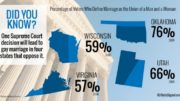Introduction Thought
What we saw before was the idea of “equal” but “different” – that men and women are equal before God, equal in salvation, and equally important to God’s kingdom.
But they are different. God created men and women differently in design and assignments. What we will look at now is a difference between our culture and God’s Word. The culture believes that our flesh is acceptable to us, and that we do no need to submit to biblical ideas.
Here are two cultural ideas in opposition of the Bible:
1. Biblical opposition to sex outside of marriage is unimportant. Free sex and unwed childbirth are acceptable. Also pornography, cohabitation, homosexuality, abortion – whatever we think about sex is perfectly acceptable.
Also our culture does not believe in the biblical opposition to divorce. Rather, the culture believes that divorce is often something we need, and it is acceptable.
2. The culture also believes that men and women do not have differences. There are differences in the flesh and body, but no differences in the life-pursuits.
Our former culture – from 1620 up to about 1960 – had an attitude toward biblical teachings. But from 1960 and over time the American culture moved away from the Bible on things like sex, divorce, homosexuality, abortion – and also male and female differences.
One of the realities of this change is that people, the society, and the economics are doing worse. But churches are also doing worse. We are moving in the secular direction of England and Europe. We need to understand God’s teachings, and as we surrender to God we need to obey His instructions.
A Biblical Difference Between Men and Women
Understanding – and accepting – a biblical difference between men and women leads us toward better marriage and family and society. Biblical directions will make our families better, make our children better, make God’s kingdom better, and make our society better.
In the previous article we saw that God’s design was for male leadership. That took place in creation with Adam, and it was God’s calling through the Old Testament and the New Testament. We saw the difference between Adam and Eve:
1. Adam was created first and he was the one receiving God’s instruction (Genesis 2:15-18f).
2. Satan focused on Eve in Genesis 3:1-6. She saw value of the fruit and Adam was supposed to take an initiative against it, but he didn’t.
So Adam was the one God judged, not Eve. In Genesis 3:9 God reached out to Adam, not Eve, even though Eve was the one who focused on the sin. We also saw that in Romans 5:12f the “single man” was the cause of sin and death. And then in 1 Corinthians 15:21-22 death came by Adam.
The point here is that Adam was the one held accountable, not Eve.
The next description is that both the Old Testament and the New Testament have used men as leaders. In the OT, men were leaders. There were feminine prophets and women as important contributors. But the kings, judges, apostles, and priests were males. (See the explanation below regarding a woman judge and a woman king.)
Throughout the NT also, men were leaders. The 12 disciples that Jesus selected were males, and they became apostles after His death and resurrection. Other apostles in the NT were males – including Paul the apostle, chosen by God. Also, the NT elders, bishops, and pastors were males.
Whereas men were chosen as leaders, several women were important. Jesus worked with women and throughout the NT women had important roles (EG – Romans 16). But they were not apostles or elders (1 Timothy 2:12, 3:1-7, Titus 1:5-9).
Two specific NT instructions are on church leaders and home leaders:
- Church authorities are not to be women – 1 Timothy 2:12. (See a response below on this.)
- Husbands are called to be home-leaders – Ephesians 5:22-24 and verses 25-33.
Two Responses on the Differences
The OT and NT use of males as leaders is something helping us to see that there is a difference between men and women. But here are two things for us to see.
1. Whereas men are called as leaders, they are not “rulers” – or “lords.” They are not called to judge others or to be in control.
- The church leadership and home leadership have a similarity.
Church leaders have initiative, but not control. In Matthew 20:25-28 Jesus instructed His disciples not to be “lords,” but to serve people. He gave Himself as an example – He does not control people, but serves them. This is what leaders are called to do.
In Ephesians 4:12, pastors are not called to do all ministry, but to train church-members to do ministry. In 1 Peter 5:1-3, they are not to be “lords” over the people.
- So husbands have a similar calling. According to Ephesians 5:22-24 they play the role of Christ as husbands, and in verse 5:25-27 they are called to do the role of Christ – serving and sacrificing self before their wives.
2. On the other hand, there are arguments against these instruction ideas.
- One of the arguments is that there was a woman as “judge” (a national leader) in the OT book of Judges. In chapter 4, Deborah was a national judge, and so that means to some believers that women did the same role as men in the OT.
The response is that the book of Judges is a description of the sin of Israel. The whole book is describing their failures before God. Deborah was a very good believer and God used her. But it was not what God wanted. Deborah herself was trying to get a man to lead, but the man she pursued refused. In Judges men were failing to obey God.
A similar example is the one woman who became a king in 2 Kings 11. As the only woman as king, she was a sinner opposing God’s plan.
- An interpretation is that 1 Timothy 2:12 is not preventing women as pastors. The belief is that it is a response only to Ephesian women who were trying to be in control.
The problem is that this is not a reasonable interpretation of the verse. There is no indication of Ephesian women as controllers. And there is no indication that the verse is applying only to Ephesian women, not to all women.
- There is also a focus on Galatians 3:28 as a description of men and women as the “same.”
But that verse is not saying that there is no difference. It is only saying that men and women are equal before God. So, for example, the verse also focuses on slaves and free-men, but elsewhere slaves were called to serve their masters and masters were called to serve their slaves (Ephesians 6:5-9, Colossians 3:22-4:1).
A helpful demonstration is that a difference in roles does not lead to lacking equality before God. A good example is 1 Corinthians 11:3, in which Christ is equal to God the Father, but He was in service to God the Father. The same thing is in John 5:19f and 5:30.
A Current View in our Culture
Our current culture believes that men and women are not different in roles. On the one hand it is fine for women to do many of the roles, but there is an illustration of differences.
Our culture says that men and women do the same thing in not only jobs and government, but also in military. Whereas it is fine for women to do jobs and politics, the military difference is one of the illustrations of a difference between men and women. The military is an example of differences between men and women:
- Women do not have the same strength ability. They sometimes can’t do what is needed. (Sports is also a place where men and women are not the same and so they play separately.)
- In war situations men tend to protect women versus doing war against enemies. This can damage the war efforts.
- The current Israelis illustrate the difference in military. They had women doing military, but over time they created slightly separate roles because they saw a difference between men and women.
These things simply illustrate the difference between men and women. There is a final observation that contributes to our understanding of differences:
- Women are statistically increasing in education, jobs, and income – and men statistically stepping out of education, jobs, and income.
- Statistically, marriage has gone down, unwed childbirth has gone up, and fatherless children doing poorly has gone up. One of the reasons is that men just focus on their flesh and sex, and when they do marry they often divorce.
The statistical idea here is that the cultural is leading us in the wrong direction, and that the culture is damaging everything – damaging families, children, the society, and God’s kingdom.
We Need to Focus on God Versus Flesh or Culture
What we need to do is see God’s design and surrender to it despite the calling of our flesh and the emphasis of our culture. It is interesting that the Bible in Ephesians gives two thoughts:
1. Ephesians 2:1-3: Our sin is based on flesh and culture that Satan uses against us.
2. Ephesians 6:10-13: Satan uses our flesh to control us – so we need to be strong in the Lord and take up His armor so that we can resist within the evil day.
In our next articles we will focus on biblical ideas of husbands and wives. This is something that can remarkably contribute to stable family-life, contribute to stable children, and contribute to both society and God’s kingdom. The roles are actually difficult due to our flesh and the culture, but if we can surrender to God and pursue His instructions versus our own feelings, then we will make a difference.
 Tom Clark is a Family Life Ambassador with the Family Life Ministry and on the Advisory Board of the Virginia Christian Alliance.
Tom Clark is a Family Life Ambassador with the Family Life Ministry and on the Advisory Board of the Virginia Christian Alliance.




